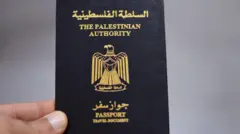In an eye-opening incident on March 29, 2025, Michael Gibbard, a 41-year-old delivery service owner, found himself at the center of a security scandal after accidentally discovering hundreds of sensitive British military documents on an industrial street in Newcastle. As he hurried to a soccer match, Gibbard initially mistook the scattered papers for trash. Upon closer inspection, however, he was taken aback to find detailed information regarding soldier names and ranks, base patrols, and weapon armory codes.
“It was a shock to my system. I thought, bloody hell, this shouldn’t be here,” he recounted, emphasizing the alarming nature of such a breach in a country renowned for protecting its national secrets. This revelation comes at a perilous moment for the United Kingdom, which is closely allied with the United States—currently grappling with its own mishandling of classified military information in a recent incident involving battle plans discussed in a group chat with a journalist.
Unlike the U.S. security breach, which stemmed from mismanaged technology on an encrypted app, the UK’s faux pas was decidedly low-tech. Gibbard noted, “I thought a lot of this would be online, and there would be military software you’d need to access it. But here it was, printed off for all the world to see. It was very old-school.” The Ministry of Defense has since stated that they are launching an investigation into how such sensitive information ended up unprotected in a public area, highlighting the pressing need for stringent measures to safeguard national security and prevent similar embarrassments in the future.





















